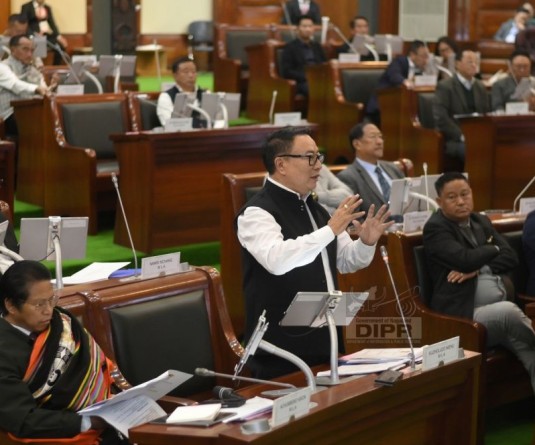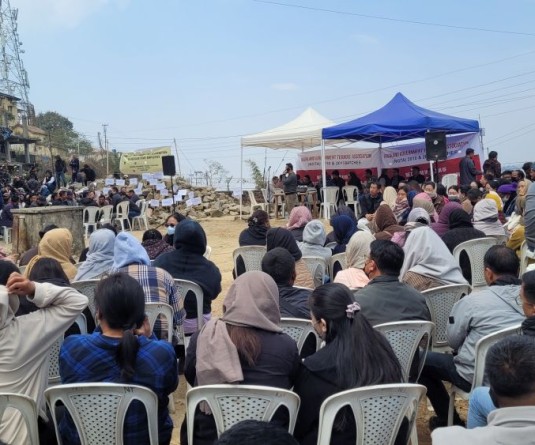
Rev. Dr. Wati Aier addresses OTS 25th Anniversary Symposium with Pastors in Dimapur
Morung Express News
Dimapur | October 6
As the social crisis in Naga society deepens, Pastors of Naga churches have been called to bring ‘Prophetic Imagination’ to their ministry if any transformative change is to be made.
Rev. Dr. Wati Aier, serving his last year as Principal of the Oriental Theological Seminary (OTS), encouraged ‘Prophetic Imagination in Pastoral Ministry’ on Thursday at the OTS 25th Anniversary Symposium Dinner with Pastors in Dimapur. As part of its ongoing 25th Anniversary celebrations under the theme ‘Sowing, Nurturing, Flourishing,’ today’s Symposium Dinner held at Hotel Acacia was an attempt by the OTS to reach out and work together with Naga churches.
Prophetic Imagination
The church wields great respect and influence in the Naga context, far greater than apex organizations or even the State Government. It is thus essential for churches to move towards “non conformity” and bring about transformative change in society with “great prophetic action.”
Noting that “our paradigm is Jesus Christ, who is not in conformity to the patterns and standards of this world,” Dr. Wati Aier reminded the congregation of Pastors that “Our vocation is not to be considered as synonymous with exercising leadership in the same way the institutions of our society functions.” Institutional leadership within churches, thus, were called to think “out of the box”—for this is true “prophetic imagination”—and bridge the gap by changing, for instance, the “ruler” and “subject” relationship within itself first. Prophetic imagination, neither romantic nor idealistic, is “renewal of society” through transformation rooted in one’s commitment to Christ, said Dr. Wati.
However, he reminded that while upholding the “uniqueness of Jesus Christ,” one must be mindful of “upholding pluralism” and “respecting other belief systems, and not employing imperialistic, theological coercion.”
Church as Collective-Identity
The church must transcend boundaries of social stratification—clan, tribe, office, faction, wealth—and become a collective front.
“Unlike our contemporary, and fragmented, social, political, and tribal realities and agendas, prophetic imagination orients us in the workings of God in the history of the church as the collective identity,” emphasized Dr. Wati. This ‘collective-identity,’ must move “beyond our boundaries”; “Prophetic imagination must stress that there is no hope for the Nagas, as well as others, without this theological understanding of the collective-identity made up of various tribes, languages, groups and ideologies” wherein “unforgiving cultural prides and exclusion” are transcended to give form to the ‘collective-identity’ equipped with “spiritual discernment and alertness to the forces of history.” Today’s prophets must believe that “we are the hope of God in society,” he stated.
Nurture : imagination : social revival
Without nurture, collective-identity will deplete and without imagination, collective-identity will perish. “Imagination without nurture can be too burdening,” said Dr. Wati, reminding the Pastors of the central importance of “pastoral nurture.”
Stating that “critical openness” is a key feature of nurture, he explained, “Practice of faith in public and political lives—for example, to be truly committed to clean elections—ultimately requires maturity in our Christian life. Prophetic imagination should be prepared to nurture the people of the collective-identity to maturity.” A strong pastoral fraternity with clear intention can help society develop this maturity.
Dr. Wati observed that there have been two Christian revivals among the Naga people in the past century yet “social revival” remains a far cry.
“We Baptists need to discover that Christ cannot be hidden at the inner core of one’s piety alone. We need to dismiss the social arena as the domain of the beast,” the leader and teacher maintained. “Our prophetic imagination of mass revival meetings and evangelistic programs must become the platforms not only for personal transformation, but also social transformation.”
‘Misplaced theology is useless’
In conclusion to a thorough and stirring speech, Dr. Wati reiterated that “misplaced theology is useless.” Knowing and not doing—having been touched by the “fire” yet to sit passively—is a “theological crime.” The church must rise from becoming a “totemic” Sunday gesture and play a “constructive role.”
Dr. Wati appealed to fellow travelers to a “prophetic imagination of cognition and of transformative praxis for the society” so that history will point to the present generation and say, “Those men and women changed our world-history.”
Dr. Wati’s paper gave way to a discussion with the Pastors present at the program. Click here






